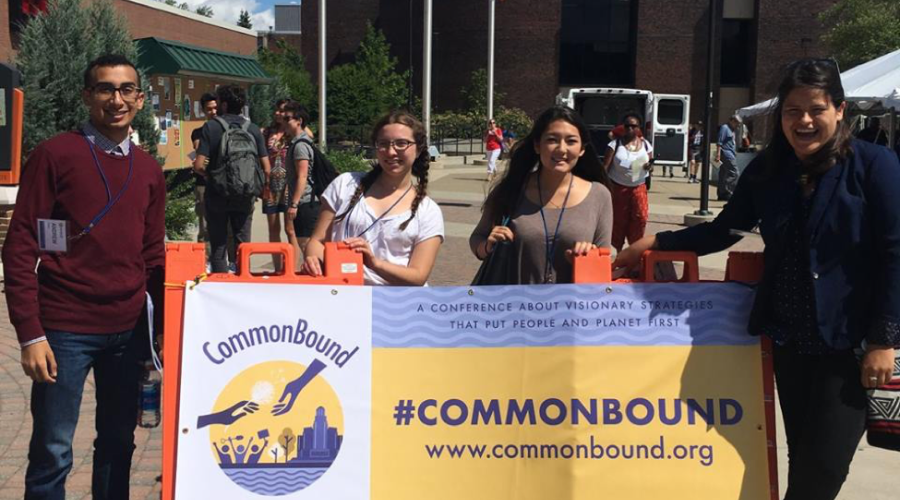
A Reflection on the New Economy and CommonBound 2016
I heard about the CommonBound Conference during my first few days in Buffalo. I heard so many program and organization names in the first few days that it’s a wonder I even remembered to Google CommonBound when I got a chance to. I learned that it was a conference held by a group called the New Economy Coalition and that it was going to be held in Buffalo in July. The conference’s Buffalo hosts are the organizations comprising the Crossroads Collective, which is an initiative funded by the Chorus Foundation to create equitable, environmentally and economically sustainable development in Buffalo to replace the current fossil fuel-based economy that does not provide living wages for a significant portion of the population. This sustainable economy is what organizations are referring to as the “new economy,” which was the basis for the CommonBound Conference.
As a student majoring in Urban and Regional Studies with a strong interest in community development, the theme of CommonBound struck a chord with me. I have seen the impacts of inequitable development at home in Baton Rouge, Louisiana, which is probably what drove me to study what I do. Now that I have been in Buffalo for five weeks, I have seen similarities between the issues facing Buffalo and Baton Rouge.
However, at least in Buffalo’s West Side, I see differences. In the West Side, the community-driven organization PUSH (People United for Sustainable Housing) Buffalo has canvassed extensively to identify problems in the neighborhood. PUSH’s solutions to these problems are environmentally sustainable as well as make life more affordable in the West Side. People are receiving job training, housing is becoming greener and more affordable, and vacant lots are converted into vibrant spaces. The difference that I see between Buffalo’s West Side and, say, north Baton Rouge is not necessarily that these areas are experiencing different problems but that the problems are being addressed in a way that many community developers might not consider. After all, isn’t it expensive to use solar power or insulate homes? When you think about it, however, the savings outweigh the costs, and there are actually ways to obtain funding to make projects such as these more affordable. PUSH has converted me to the side of the new economy, which I didn’t even realize was a thing until this summer.
With a newly found passion and a desire to take advantage of everything that Buffalo has to offer, I committed to spend my fifth weekend in Buffalo learning about the new economy. Three other intrepid High Roaders also decided to come. This was the first conference I’ve attended that wasn’t designed for students, and I was taken aback at the number of people who had travelled from not just around the country but from around the world to be there. One of the High Roaders seemed mesmerized at the variety of people from all walks of life and dressed in all sorts of styles wandering around the Buff State campus on the first morning.
Equipped with my notebook and pen, I went to my first panel of the day. Each block of time had a variety of panels that CommonBound attendees could choose from, and two of the other High Roaders and I decided to learn about New York Renews. Earlier that week, I had been speaking with a staff member from PUSH who had mentioned New York Renews, but I didn’t fully understand what the program was or how PUSH was involved. Basically, the act will reduce harmful emissions and create revenue by charging polluters, of which 40% will go to environmental justice communities. I learned about the importance of being a “bubble popper,” as one of the panelists put it. You can’t stay within your organization’s bubble and expect to accomplish big things. Big things require partnerships and coalitions. You have to talk with people outside of your bubble!
The next panel that I chose to attend was actually bilingual and conducted primarily in Spanish. In order to allow people who don’t understand both languages to participate, there were interpreters in the room who broadcasted a translation via a headset. This inclusivity really captures what the new economy will look like: finding ways to make sure that everyone can participate.
After lunch, there were a variety of activities to choose from including group conversations and tours. One of the High Roaders’ supervisors was leading a tour of Tonawanda, where a coal plant is being decommissioned. She persuaded us to go with her, and I’m glad I went! I learned about the impact that the closure of the coal plant is going to have on Tonawanda. It’s even going to impact the teachers’ union! As someone with a basic understanding of labor unions, it was really interesting to learn more about how they function and how they protect workers. As the U.S. cuts back on pollution, this is likely to be a problem that I’ll be faced with as a city planner or community developer a few years from now.
After the last panel of the day, we all headed home exhausted but enlightened and excited for day two of CommonBound!
